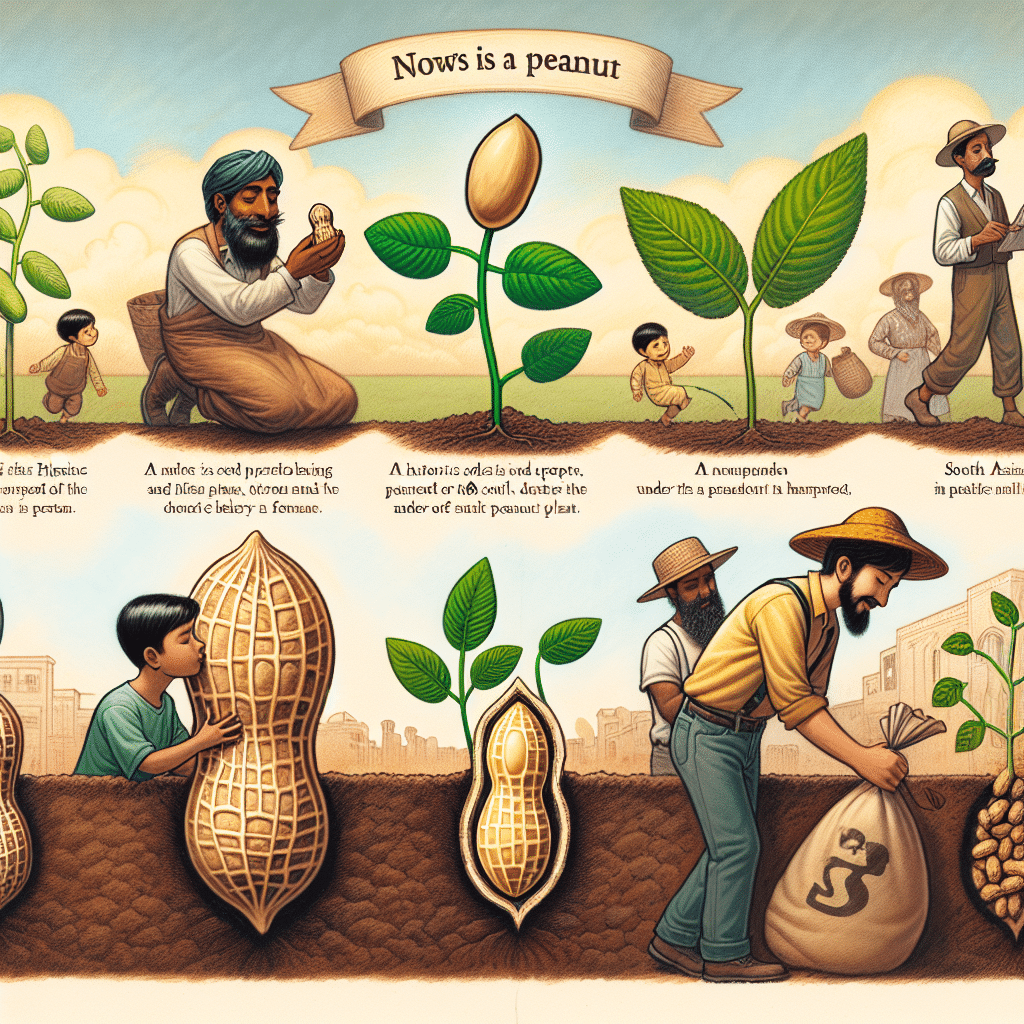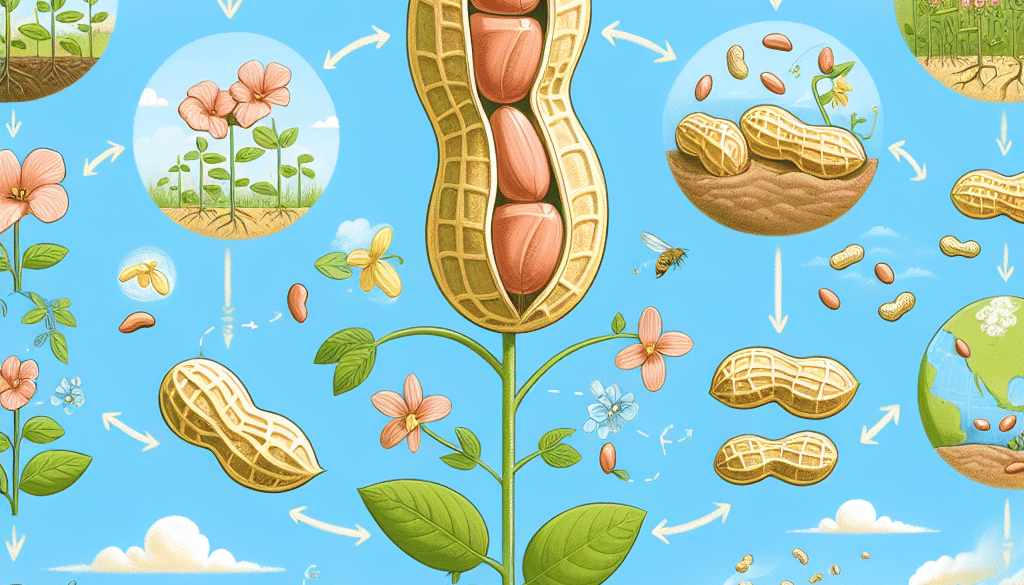Origin of Peanut: A Nut’s Historical Journey
-
Table of Contents
- Peanut’s Historical Journey: Tracing the Origins of a Beloved Nut
- The Ancestral Roots of Peanuts
- Spread Across the Globe
- The Peanut in North America
- The Nutritional Profile of Peanuts
- Peanuts in the Modern World
- Challenges and Sustainability
- Conclusion: The Enduring Legacy of the Peanut
- Discover the Power of Peanuts with ETprotein
Peanut’s Historical Journey: Tracing the Origins of a Beloved Nut

The peanut, also known as the groundnut, is a legume crop grown mainly for its edible seeds. It is a staple in diets around the world, used in everything from snacks to main dishes and even in the production of oil. But the peanut is more than just a tasty treat; it has a rich history that spans continents and cultures. In this article, we will delve into the fascinating origins of the peanut and its journey through time.
The Ancestral Roots of Peanuts
The story of the peanut begins in South America, where it is believed to have originated. Archaeological evidence suggests that peanuts were being cultivated in the valleys of Paraguay and Brazil over 7,500 years ago. Ancient cultures such as the Incas used peanuts in burial rituals, placing them alongside mummies to aid in the afterlife. The peanut was not only a source of sustenance but also held spiritual significance.
Spread Across the Globe
The peanut’s journey from South America to the rest of the world is a tale of exploration and trade. Spanish and Portuguese explorers encountered the peanut in their travels and brought it back to Europe. From there, it spread to Africa and Asia through trade routes. In Africa, peanuts found a hospitable climate and quickly became integrated into local agriculture and cuisine.
The Peanut in North America
It wasn’t until the 1700s that peanuts made their way to North America. Initially, peanuts were primarily used as food for livestock and the poor. However, their popularity grew during the Civil War when soldiers from both sides relied on peanuts as a high-protein food source that was easy to carry.
The peanut industry in the United States owes much of its success to the work of Dr. George Washington Carver, an African American scientist and inventor. Carver developed over 300 uses for peanuts, including peanut butter, which helped to stabilize the agricultural economy of the southern United States and improve the livelihoods of many farmers.
The Nutritional Profile of Peanuts
Peanuts are not only delicious but also packed with nutritional benefits. They are an excellent source of protein, healthy fats, vitamins, and minerals. Here are some key nutritional highlights:
- Rich in monounsaturated and polyunsaturated fats
- Good source of Vitamin E, niacin, folate, and manganese
- Contains bioactive compounds like resveratrol
- High in antioxidants
These nutritional properties make peanuts a valuable food for maintaining heart health, managing weight, and supporting overall well-being.
Peanuts in the Modern World
Today, peanuts are a global commodity. China, India, and the United States are the top producers, contributing to a multi-billion-dollar industry. Peanuts are consumed in various forms, from raw and roasted to peanut butter and oil. They are also used in a variety of cuisines, showcasing their versatility as an ingredient.
Challenges and Sustainability
Despite their popularity, peanuts face challenges such as crop diseases, pests, and the need for sustainable farming practices. Climate change also poses a threat to peanut cultivation, as it can affect the delicate balance of temperature and moisture that peanuts require. Researchers and farmers are working together to develop more resilient peanut varieties and sustainable farming techniques to ensure the future of this important crop.
Conclusion: The Enduring Legacy of the Peanut
The peanut has come a long way from its origins in South America to becoming a global culinary staple. Its rich history is intertwined with the stories of cultures, explorers, and innovators. As we continue to enjoy peanuts in all their forms, it’s important to appreciate the journey this humble nut has taken and the impact it has had on the world.
Discover the Power of Peanuts with ETprotein
If you’re looking to incorporate high-quality peanut protein into your diet or products, ETprotein offers a range of organic and non-GMO peanut protein options. Their peanut protein is perfect for enhancing the nutritional profile of various foods and beverages, providing a neutral taste that complements any recipe.
ETprotein’s commitment to quality and sustainability makes them a top choice for consumers and manufacturers alike. Explore their selection of plant-based proteins and discover how you can benefit from the nutritional power of peanuts.
About ETprotein:
ETprotein, a reputable protein Chinese factory manufacturer and supplier, is renowned for producing, stocking, exporting, and delivering the highest quality organic bulk vegan protein and plant proteins. They include Organic rice protein, clear rice protein, pea protein, clear pea protein, pumpkin seed protein, sunflower seed protein, mung bean protein, peanut protein etc. Their offerings, characterized by a neutral taste, non-GMO, allergen-free attributes, cater to a diverse range of industries. They serve nutraceutical, pharmaceutical, cosmeceutical, veterinary, as well as food and beverage finished product distributors, traders, and manufacturers across Europe, USA, Canada, Australia, Thailand, Japan, Korea, Brazil, and Chile, among others.
ETprotein specialization includes exporting and delivering tailor-made protein powder and finished nutritional supplements. Their extensive product range covers sectors like Food and Beverage, Sports Nutrition, Weight Management, Dietary Supplements, Health and Wellness Products, and Infant Formula, ensuring comprehensive solutions to meet all your protein needs.
As a trusted company by leading global food and beverage brands and Fortune 500 companies, ETprotein reinforces China’s reputation in the global arena. For more information or to sample their products, please contact them and email sales(at)ETprotein.com today.












